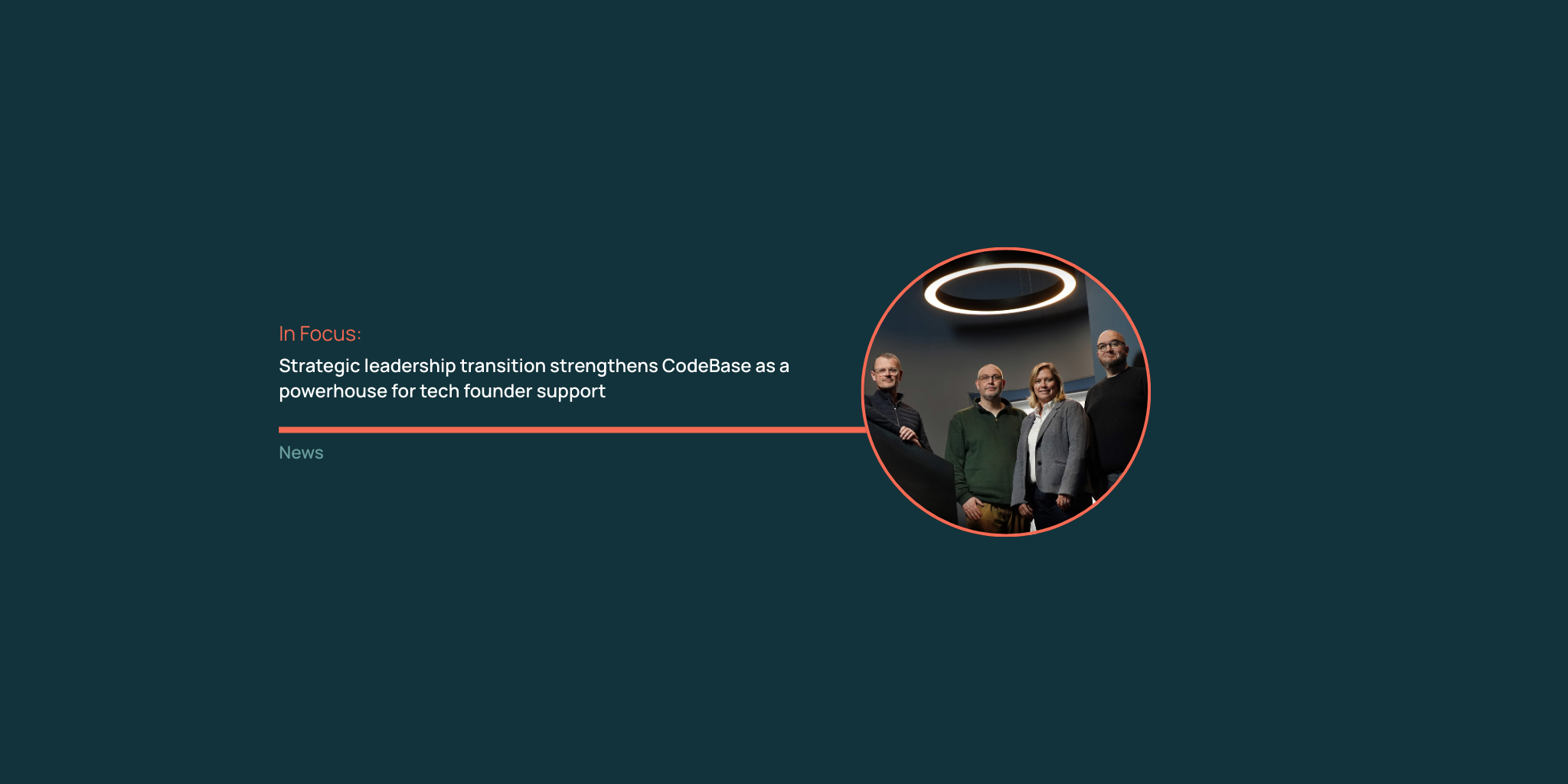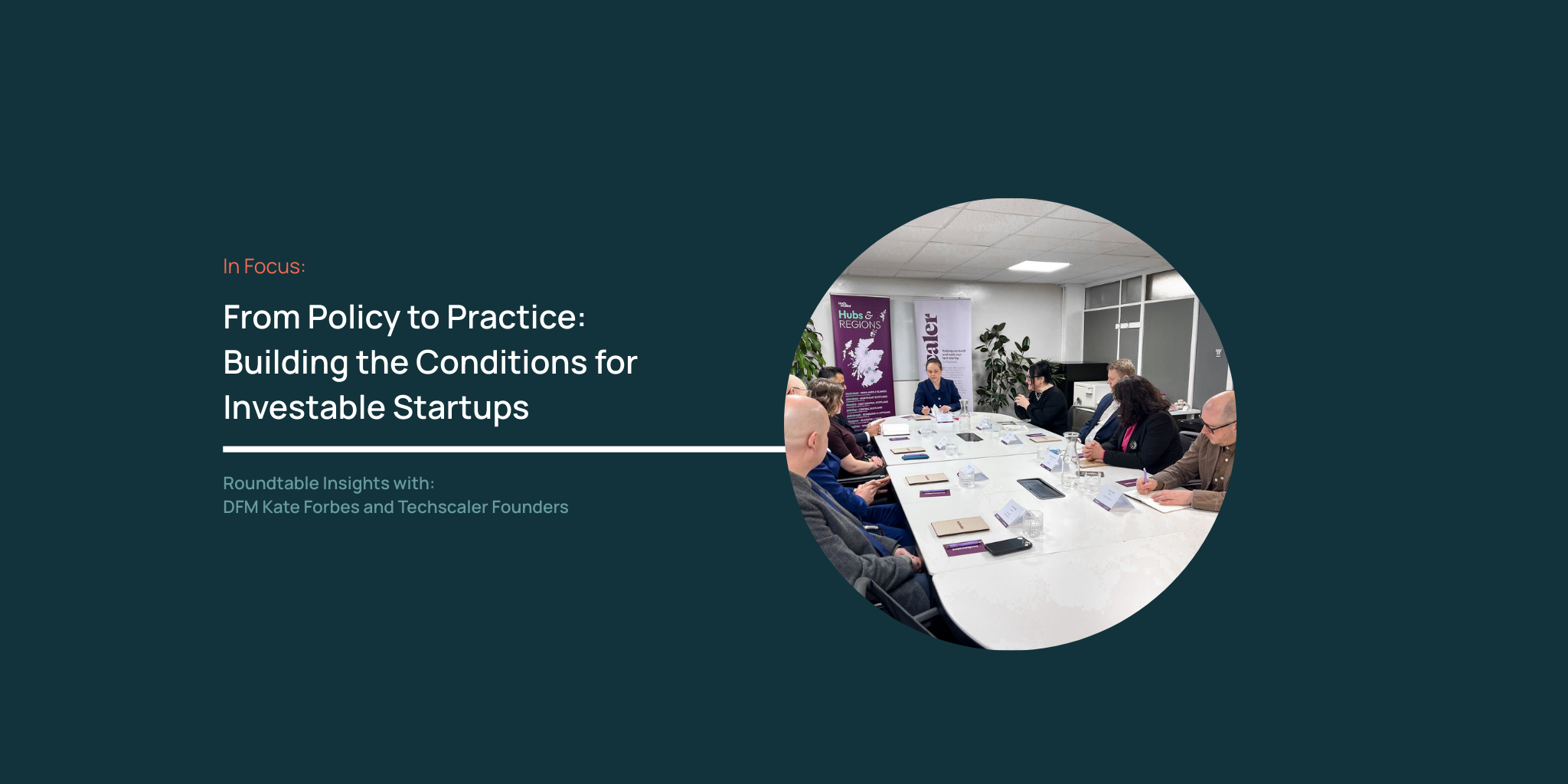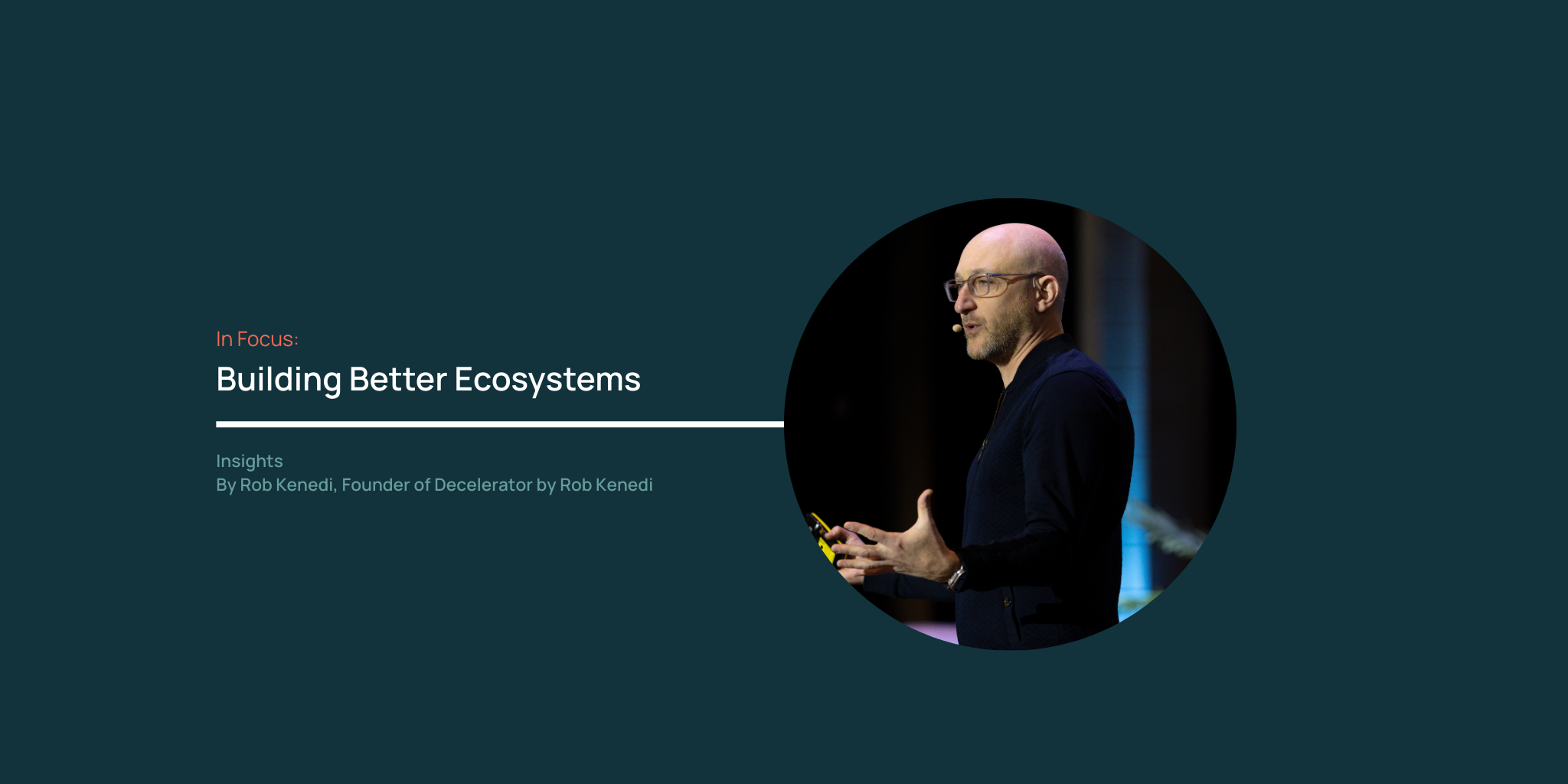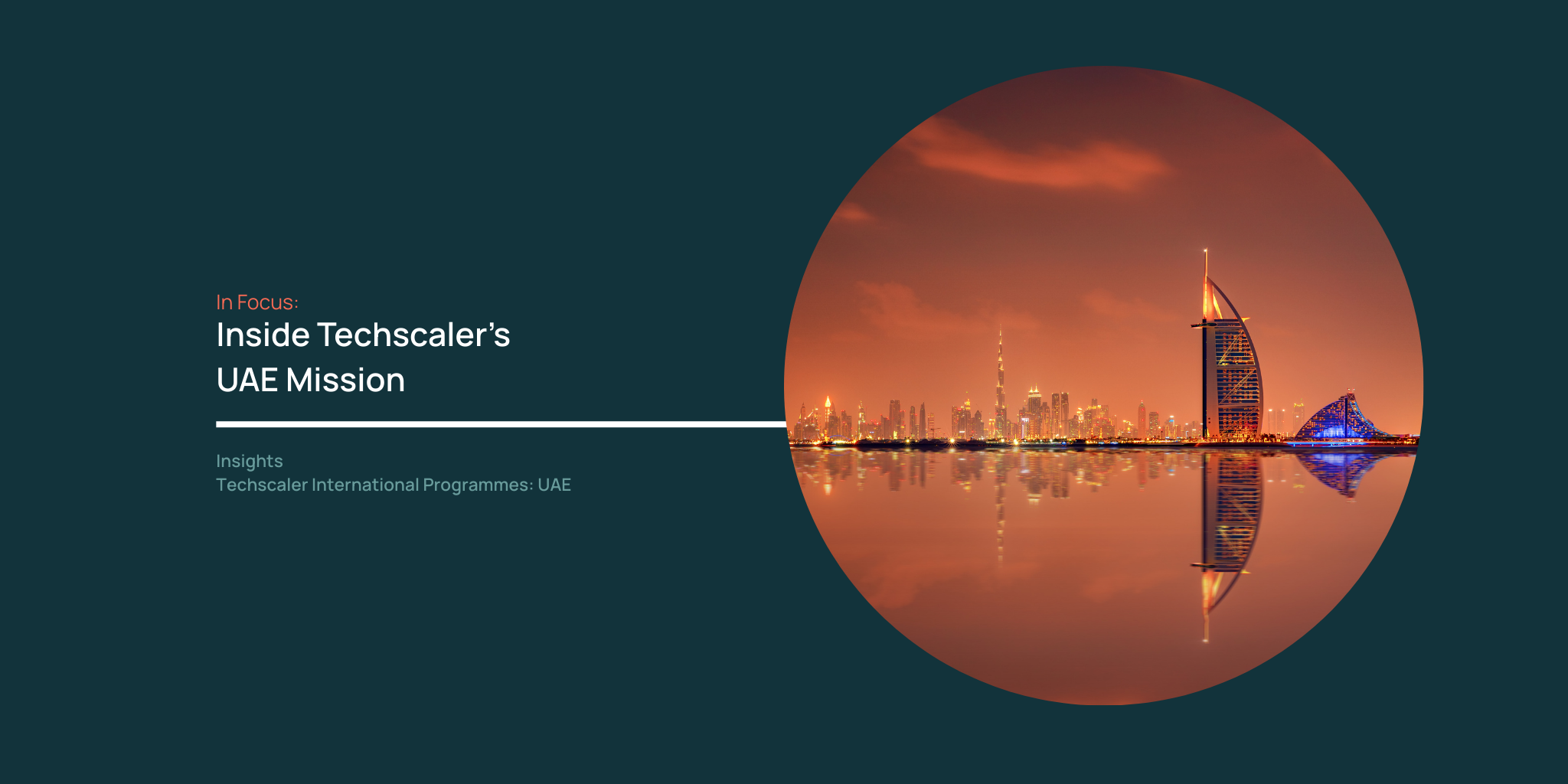Founders at the Heart: Strengthening Scotland’s Startup Ecosystem
Scotland’s startup scene has grown dramatically in recent years, with record numbers of companies being founded and backed. But capital and infrastructure alone aren’t enough. Thriving ecosystems also depend on lived experience, on the knowledge of people who’ve been there, done it, and are ready to help the next wave. From the ideation through to scale, access to the right expertise at the right moment can make the difference between a company stalling and one breaking through.
At every stage of a founder’s journey, access to the right expertise matters. And the most valuable lessons come from those who’ve walked the path before.
My Journey: A Foot in the Door
To bring this to life, here’s a little of my own story. In my twenties, I was a director of a care company with absolutely no background in tech. In 2016, I knocked on the door of CodeBase, and little did I know that step would have such a profound impact on my career and business.
At the time, CodeBase itself was in its own ‘pre-seed’ stage of ecosystem building, where conversations happened in corridors, in passing, or on the way to grab lunch. The team at CodeBase helped me understand the language of tech business: what a pitch deck was, what investors were looking for, and nudged me to do the research and take action.
That encouragement and guidance opened the door to my first two investors, introductions to Scottish Enterprise, and being pointed toward Scottish EDGE. Eventually, it even led to our first hires coming from Skyscanner and FanDuel. Yes, I had to follow through on those introductions and convert them, but without that foot in the door and those small but significant nudges of encouragement that built my confidence, would it all have happened? Honestly, I don’t think so.
From that starting point, we went on to raise around £12 million across various funding sources. The lesson for me was clear: ecosystems multiply the effect of your own effort when you have the right knowledge and encouragement around you.
Idea Stage: Learning From Those Who’ve Just Started
For founders at the very beginning, sitting with an idea, sketching it on paper, or building a prototype, the biggest hurdles are often around clarity, validation, and courage. At this stage, the most valuable people to learn from are current advisors and industry experts who are actively engaged in the ecosystem, alongside founders who have recently taken those first steps themselves.
There’s something uniquely powerful about hearing directly from someone who has just raised their first cheque, built their MVP, or recruited their first hire, or from advisors who are working with multiple early-stage companies right now and see patterns across them. Their insights are fresh, relatable, and often more practical than anything you’ll find in the latest startup book. These voices demystify the process: How do you go from zero to one? How do you test whether an idea is really viable? And what pitfalls can you avoid in those fragile early months?
Having this access early on helps strip away some of the fear and uncertainty. It sets a baseline of confidence that others have been exactly where you are and made it out the other side.
Early Growth: Guidance From Experienced Founders and EIRs
Once a startup has raised some capital, hired a small team, and started to grow, the challenges shift. It’s no longer just about proving the idea; it is about building an organisation around it. Here, the most impactful support comes from founders who are a few years ahead in the journey and Entrepreneurs in Residence (EIRs) who have hard-won experience to share.
These individuals understand the messy middle: how to manage burn, how to build culture, how to sell as a founder, and how to balance ambition with focus. They can empathise with the pressure of having a team rely on you, the uncertainty of fundraising, and the constant grind of pushing a product into the market.
Crucially, these mentors don’t just give generic advice; they share what actually worked and what they would do differently if they had the chance again. Having them embedded in Scotland’s ecosystem and available for structured or informal conversations ensures that valuable lessons aren’t lost but passed on to the next cohort.
Scaling Up: Expertise From Leaders Who’ve Been Through Internationalisation and Exits
For the small number of startups that reach true scale, the complexity multiplies. The focus shifts to internationalisation, operational excellence, and leadership at scale. At this phase, advice from early-stage founders (useful as it was before) is no longer enough. What’s needed are insights from leaders who have taken companies across borders, built multi-market operations, and guided teams through acquisitions or IPOs.
These individuals may be former founders or early employees who played critical roles in scaling successful Scottish or international companies. They understand how to expand into the US or Europe, how to navigate regulatory complexity, how to build leadership teams, and how to prepare a company for an eventual exit. That knowledge is scarce, hard-won, and immensely valuable to the Scottish companies with the potential to become global leaders.
Embedding this expertise back into the ecosystem is vital. Without it, ambitious companies risk reinventing the wheel or making costly mistakes. With it, Scotland can build repeatable playbooks for scaling and ensure its startups can compete internationally.
Keeping Knowledge in Scotland
The thread running through all of this is the importance of retaining and circulating talent and knowledge within Scotland. Too often, when a company exits or a leader moves on, their expertise disperses, sometimes abroad, sometimes out of the startup world altogether. If we don’t create clear pathways for these people to give back, we lose one of the most valuable resources an ecosystem can have.
This means:
- Making it simple and attractive for experienced founders and operators to engage with earlier-stage companies.
- Creating structured roles (EIRs, mentors, advisors) that recognise and reward the value of experience.
- Building networks that help founders quickly connect with people who have already navigated the challenges they face, whether that is US expansion or another critical step.
It also means nurturing a culture where giving back is seen as part of the journey. The best ecosystems, like Silicon Valley, are built on cycles of founders helping founders. If Scotland can entrench this mindset, the benefits will compound over decades.
Right Advice, Right Time
Capital, talent, and infrastructure all matter. But timely knowledge transfer may be the single biggest lever to take Scotland’s startups from promising to world-leading.The key is ensuring that at every stage, idea, early growth, and scale, founders have access to people who’ve lived that exact phase and can share what really matters.
My own journey shows just how pivotal this can be. Without CodeBase, without the ecosystem, and without those early nudges that helped me learn the language of tech, I doubt we would have raised the £12 million we eventually did. That lived experience, of being guided, learning, and then passing it on, is what turns individual success into ecosystem momentum.
We already have incredible talent and expertise in Scotland. The challenge and opportunity ahead is to keep it here, make it easy to access, and ensure it flows to the companies with the highest potential. If we get this right, Scotland’s next generation of startups will succeed here and thrive on the global stage.








.svg)


